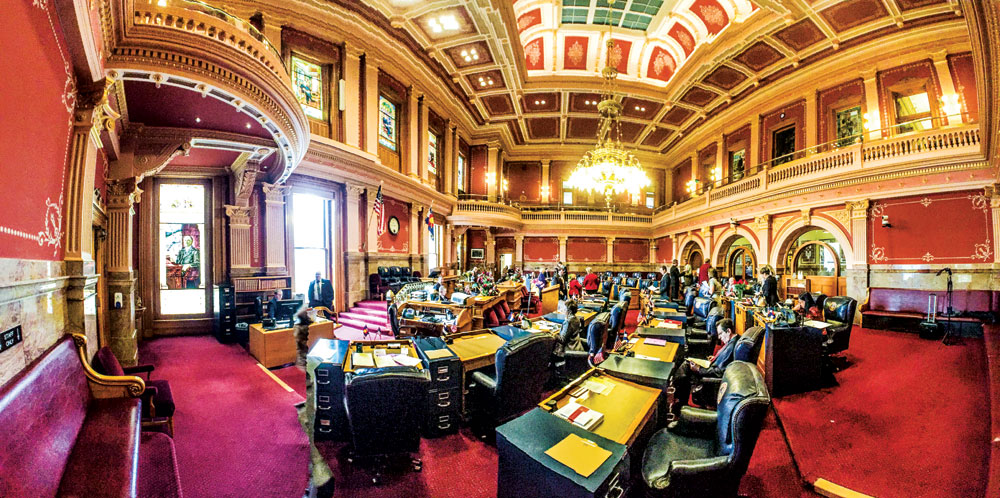
Senate Chamber
The tentative optimism conveyed by area legislators in January regarding the upcoming session of the Colorado General Assembly appears to have been justified. By all accounts, this was the most successful legislative session in a decade, culminating in an omnibus bill (SB-267) that will generate new money for transportation projects ($1.9 billion) and prevent major cuts to hospital budgets through reclassification of the hospital provider fee. Other major accomplishments cited by northeast Denver legislators include staving off further cuts to public schools and approving a partial reform to the way that construction defects in condominium projects are handled.
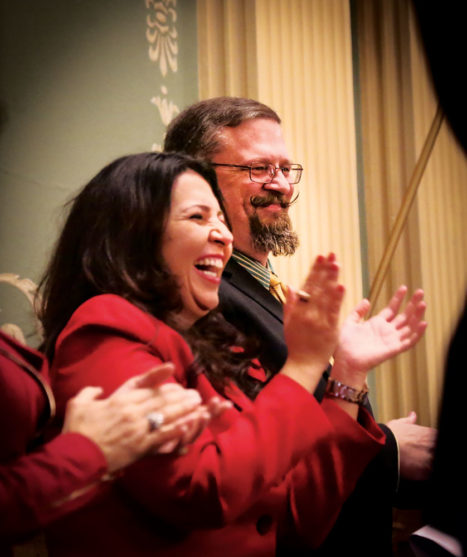
Speaker of the House Crisanta Duran (D) and Senate president Kevin Grantham (R) struck a conciliatory tone early in the session but were unable to win passage of the major transportation funding bill (HB17-1242).
In January, all state legislators in the Front Porch distribution area were either new to the General Assembly or were moving from the House to the Senate. The optimism natural to newcomers was reinforced, they said, by a sense that the public has wearied of ideological debates and wants politicians to solve real-world problems. In contrast to the federal government, they also viewed Colorado’s split legislature (Democrat-dominated House, Republican majority of one in the Senate) as an advantage: any bill would need support from both parties, thus mandating the ability to compromise if anything was to be accomplished.
In the end, Democratic Gov. John Hickenlooper pronounced 2017 as the most productive of his tenure, which dates to 2011.
Area legislators uniformly cited some increased funding for transportation and avoided cuts for schools and hospitals as major accomplishments this session. They also uniformly decried the failure of another bill, HB-1242, as the major disappointment. That bill would have presented an opportunity for voters to weigh in this November on a state sales tax increase to support $3.5 billion in transportation projects. Despite support in both chambers, the bill was killed in committee by three conservative Republicans. Sen. Lois Court, representing District 31, said, “It was absurd that these Republican senators were unwilling to ask the voters if they want to approve this tax increase for transportation, which is exactly what TABOR allows for.” (TABOR is the Taxpayer Bill of Rights, a 1992 constitutional amendment that prohibits tax increases without public votes in a jurisdiction.)
Perhaps the leading example of compromise this session involved the hospital provider fee (HPF). At the beginning of the session, Republican leadership made it clear that reclassification of the HPF was a nonstarter. Democrats had been pressing the past three years to classify that fee as an enterprise fund to create some $700 million of spending capacity under the state’s revenue cap before it is required, by TABOR, to give tax refunds. Enough Republicans eventually broke ranks under pressure to avoid massive cuts to public schools and rural hospitals. Trade-offs included higher Medicaid copays and a lowered future cap on state revenues.
The Front Porch polled area legislators and below we present their responses (edited for length) to our questions about the best and worst outcomes of the session that concluded May 10. We also asked them to cite the successful legislative initiatives in which they were personally involved. The legislators measure success not only as approved bills but two categories of bills that did not pass: those that they opposed and those presenting new ideas for the first time and which, over time may earn broader acceptance. Find comments from your own legislator below:
Our two state senators divide the Front Porch distribution area roughly in half, with Sen. Williams representing a sprawling district that extends from DIA to downtown and includes Stapleton, Montbello and Green Valley Ranch. Sen. Court’s district runs from approximately the Colfax Avenue corridor south as far as Glendale and the northern end of the Denver Tech Center.
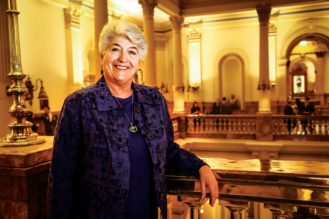
Sen. Lois Court
Sen. Lois Court, District 31.
Best accomplishments: Reclassifying the HPF, addressing construction defects and passing a budget that allowed for a slight increase in per pupil funding. Worst outcome: Defeat of HB-1242. Personal accomplishments: Approved bills to increase fines for texting while driving (SB17-027), and to make it legal for people to break car windows after exhausting all other options to save dogs, cats and people who are endangered in a closed vehicle (HB17-1179); “voicing my opposition to various bills that I thought would be harmful to our state including bills to require doctors to give dubious information and non-medically necessary procedures to women seeking an abortion, a bill that would have had a far-reaching negative impact on our LGBTQ community, and an effort to repeal our Colorado Healthcare Exchange.”
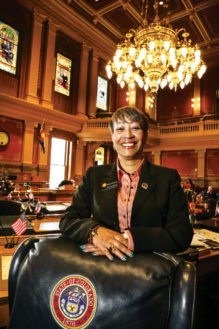
Sen. Angela Williams
Sen. Angela Williams, District 33.
Best: HPF reclassification, the omnibus budget bill, avoiding public school budget cuts, funding new programs for affordable housing and services for the chronically homeless, and additional veteran services. Worst: Defeat in committee of HB-1242. Personal: To address the construction defects problem, “we were able to pass HB17-1279, a bill that preserves homeowners’ rights while promoting building of attainable housing.” A notable provision requires a vote by a majority of condo owners, rather than just of an HOA board, to approve litigation against a builder/developer. Williams co-sponsored SB17-142, a bill that will require facilities providing mammograms to notify women if they have dense breast tissue, a condition that is a risk factor for cancer and lowers the ability of mammograms to detect cancer. Other successful bills she co-sponsored: HB17-1375, a bill that ensures equity in funding and accountability in our public schools. The bill requires equitable distribution of mill levy override dollars among all public schools in a district and adds transparency requirements for charter schools; HB17-1138, which will require the Department of Safety to record and report data on hate crimes; and, SB17-088, which requires transparency in healthcare provider selection for a network. This will make navigation of the healthcare system easier for patients and physicians.
House District 7 somewhat mirrors Senate District 33, beginning at DIA and sweeping west to include Stapleton and east Park Hill. District 8 extends west from House District 7 to York Street and Five Points. District 6 is centered on Lowry, bounded roughly by the Colfax corridor, Downing Street to the west and south to Louisiana Street.
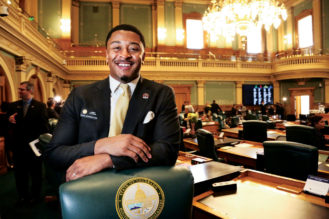
Rep. James Coleman
Rep. James Coleman, District 7.
Best: “Among the strong accomplishments by the General Assembly was the increase of K-12 funding by $242 per child, and the passage of solutions to construction defects that will encourage builders to develop more affordable housing options for the people of Colorado.” Worst: “If there was one thing we would hope to have better next session, it would be the improvement of bipartisan efforts regarding bill passage.” Personal: Successful introduction of these bills: HB17-1201, authorizing a high school diploma endorsement in science, technology, engineering and mathematics (STEM) to students who demonstrate mastery in STEM; HB17-1211, creating a pilot program (gifts, grants and donations only) for schools to develop professional development strategies to encourage culturally responsive methods of student discipline; HB17-1215, creating the peace officers mental health support grant program and encouraging police and sheriff’s departments to provide on-scene response services to support officers’ handling of persons with mental health disorders; and, HB17-1214, requiring the Colorado Office of Economic Development to promote employee ownership as part of its small business assistance center.
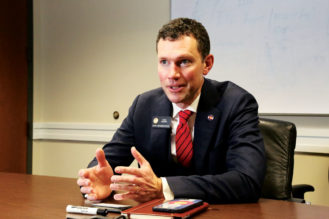
Rep. Chris Hansen
Rep. Chris Hansen, District 6
Best: “Conversion of the HPF into an enterprise which saves many hospitals from closure and preserves more than $500 million in funding for healthcare, but most importantly, it will save lives.” Worst: Defeat of the transportation funding bill (HB-1242). “The citizens of Colorado deserve high-quality roads and public transit options. It was disheartening to get so close to passing a balanced proposal and to come up short.” Personal: 14 bills and resolutions that he sponsored including six signed into law: HB17-1173, which protects doctors and nurses against retaliation from insurance companies; HB17-1151, legally defines electrical assisted bicycles and their use in order to promote use and increase possible production of them in the state; HB17-1263, allows owners of self-storage facilities to offer small lines of insurance to occupants in order to protect their stored property; HB17-1289, creates a legislative study committee to examine a streamlined methodology for calculating historic consumptive use (HCU) of a water right, alleviating the high cost frequently associated with Water Court and improving water use efficiency in Colorado. He regretted the demise of HB17-1339 that addressed the “impact of power plant closures on the host community while reducing ratepayer costs and carbon pollution.”
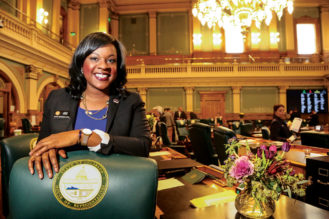
Rep. Leslie Herod
Rep. Leslie Herod, District 8. Best: Adoption of the budget, or “Long Bill” (SB-254) increasing K-12 funding by $242 per child. Other top accomplishments included needed reform to the Division of Youth Corrections (HB17-1329) and boosting funding for substance abuse treatment (SB17-193). Worst: Inability to find compromise in tackling the state’s struggles with transportation funding including the defeat of HB17-1242. “This is a huge loss to the state and I worry that we may have missed our window to implement a statewide transportation solution. It is still my hope that we will see a transportation funding initiative on the ballot.” She also regrets the failure to continue funding the Clean Energy Office. Personal: “I am proud to say that this was a very productive session! In my freshman legislative year, I was able to pass eleven pieces of legislation and authored two amendments to the budget. The wins far exceeded the losses for Coloradans.” HB17-1055 Urban Peak Tax Check Off: allows an optional tax check off box to be added to redirect Coloradans’ refund to Urban Peak, the leading organization in the state that tackles youth homelessness. SB17-179 Solar Permit Fees: limits on the amount of fees that can be assessed on solar energy device installations. HB17-254 Tampon Amendment: Provides tampons to women in the Department of Correction, which they currently have to pay for personally – to defend a woman’s health and dignity. HB17-254 TGYS Amendment: Utilized marijuana cash fund dollars to increased funding for the Tony Grampsas Youth Services program by $1 million. TGYS supports programs to help prevent child abuse and neglect, and reduce youth crime and violence. HB17-1313 Civil Asset Forfeiture: still awaiting signature by the Governor, the bill will boost transparency in the practice of civil asset forfeiture protecting the property and due process rights of Coloradans and limiting federal overreach.



0 Comments